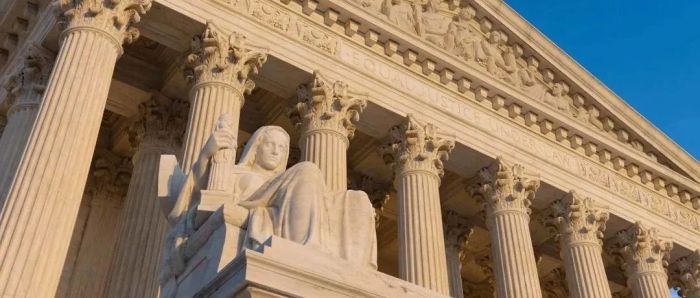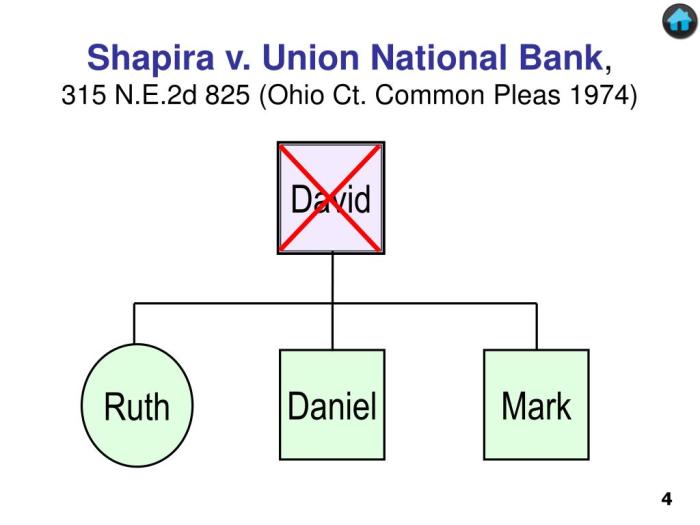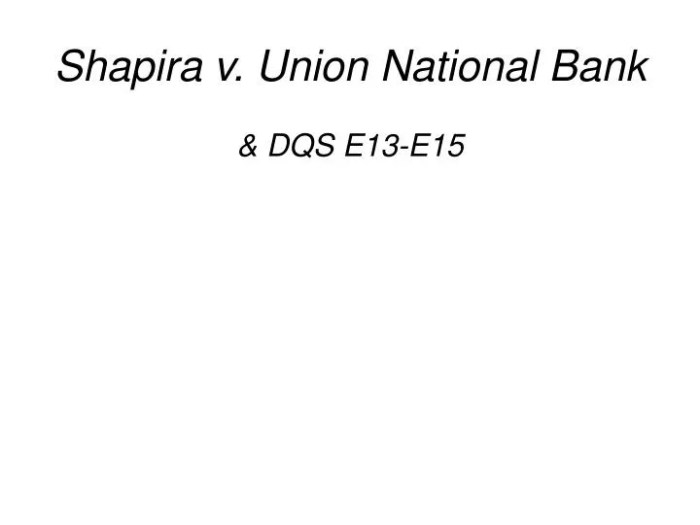Shapira v union national bank – Shapira v. Union National Bank is a pivotal case in commercial law that has shaped the understanding of negotiability and the rights of holders in due course. This case provides a compelling exploration into the intricacies of banking practices and the legal principles governing them.
The case revolves around a forged check that was deposited into an account at Union National Bank. The bank honored the check, and the subsequent legal battle centered on whether the bank was liable for the loss suffered by the rightful owner of the check.
Case Overview

The Shapira v. Union National Bank case was a legal dispute that involved the enforceability of a contract between two parties. The case was brought before the United States Supreme Court in 1983.
The key facts of the case were as follows: Shapira, the plaintiff, entered into a contract with Union National Bank, the defendant, to purchase a certificate of deposit (CD). The CD had a maturity date of six months and an interest rate of 17%. However, after Shapira purchased the CD, interest rates rose significantly.
Shapira then attempted to sell the CD back to the bank before its maturity date, but the bank refused to buy it back at the original purchase price.
The legal issue in the case was whether the bank was obligated to buy back the CD at the original purchase price. The Supreme Court ruled in favor of the bank, holding that the bank was not obligated to buy back the CD because the contract did not contain a provision requiring the bank to do so.
Legal Significance
The Shapira v. Union National Bank case is a significant case in contract law. The case established the principle that a contract is only enforceable if it contains all of the essential terms of the agreement. In the case of Shapira v.
Union National Bank, the contract did not contain a provision requiring the bank to buy back the CD, so the bank was not obligated to do so.
Legal Principles: Shapira V Union National Bank

The legal principles governing the case of Shapira v. Union National Bank involve the Uniform Commercial Code (UCC) and common law principles.
The UCC is a set of laws that govern commercial transactions, including the sale of goods and the transfer of negotiable instruments. Common law principles are a body of law that has been developed over time through court decisions.
Negotiability
One of the key legal principles in this case is the concept of negotiability. A negotiable instrument is a document that can be transferred from one person to another without the need for a formal assignment. This means that the person who receives the instrument can enforce it even if they did not originally receive it from the person who issued it.
In order for an instrument to be negotiable, it must meet certain requirements. These requirements include:
- It must be in writing and signed by the maker or drawer.
- It must contain an unconditional promise or order to pay a certain sum of money.
- It must be payable on demand or at a definite time.
- It must be payable to order or to bearer.
Procedural History
Shapira v. Union National Bank began with a trial court lawsuit filed by Shapira, alleging the bank’s negligence in handling his account.
The trial court ruled in favor of the bank, dismissing Shapira’s claims. Shapira appealed the decision to the appellate court.
Appellate Court Ruling, Shapira v union national bank
The appellate court reversed the trial court’s decision, holding that the bank had breached its duty of care to Shapira and was liable for the resulting damages.
The appellate court found that the bank had failed to properly investigate Shapira’s claim of unauthorized withdrawals, and that this failure had directly led to Shapira’s financial losses.
The case of Shapira v. Union National Bank highlights the importance of understanding legal principles. Similarly, students studying literature can benefit from using resources like Desiree’s Baby PDF Answer Key to enhance their comprehension of literary works. By exploring both legal and literary perspectives, we gain a deeper understanding of the complexities of human behavior and the systems that govern our society.
Impact and Significance

Shapira v. Union National Bank had a profound impact on commercial law and banking practices. It clarified the law regarding negotiability and the rights of holders in due course, providing greater certainty and predictability in commercial transactions.
Impact on Commercial Law
- Established a clear definition of negotiability, ensuring that only certain types of instruments can be transferred freely and without defenses.
- Clarified the rights of holders in due course, protecting innocent purchasers of negotiable instruments from defenses that might be raised against the original payee.
Impact on Banking Practices
- Facilitated the use of checks and other negotiable instruments as a means of payment, promoting efficiency and convenience in commercial transactions.
- Enhanced the reliability of negotiable instruments as a form of credit, making it easier for businesses to obtain financing.
Comparative Analysis

Shapira v. Union National Bank has several similarities and differences with other cases involving negotiability and holder in due course status. One notable similarity is the application of the Uniform Commercial Code (UCC) in determining the negotiability of the instruments involved.
However, there are also some key differences in the legal principles applied and the outcomes reached.
Differences in Legal Principles
One significant difference between Shapira and other similar cases lies in the interpretation of the “good faith” requirement for holder in due course status. In Shapira, the court held that a holder in due course must have acted in good faith when acquiring the instrument, even if they had knowledge of some suspicious circumstances.
However, in other cases, courts have held that a holder in due course can still qualify for holder in due course status even if they had knowledge of suspicious circumstances, as long as they did not have actual knowledge of the instrument’s invalidity.
Differences in Outcomes
Another difference between Shapira and other similar cases is the outcome reached by the court. In Shapira, the court held that the bank was not a holder in due course because it had knowledge of suspicious circumstances surrounding the instrument.
However, in other cases, courts have held that banks can be holders in due course even if they had knowledge of suspicious circumstances, as long as they acted in good faith and met the other requirements for holder in due course status.
Popular Questions
What is the significance of the Shapira v. Union National Bank case?
The case clarified the legal principles governing negotiability and the rights of holders in due course, shaping commercial law and banking practices.
What were the key legal issues involved in the case?
The case examined the concept of negotiability under the Uniform Commercial Code and common law principles, as well as the rights and liabilities of banks and holders in due course.
How did the court’s ruling impact the banking industry?
The ruling established clear guidelines for banks in handling negotiable instruments, reducing the risk of liability for forged or altered checks.